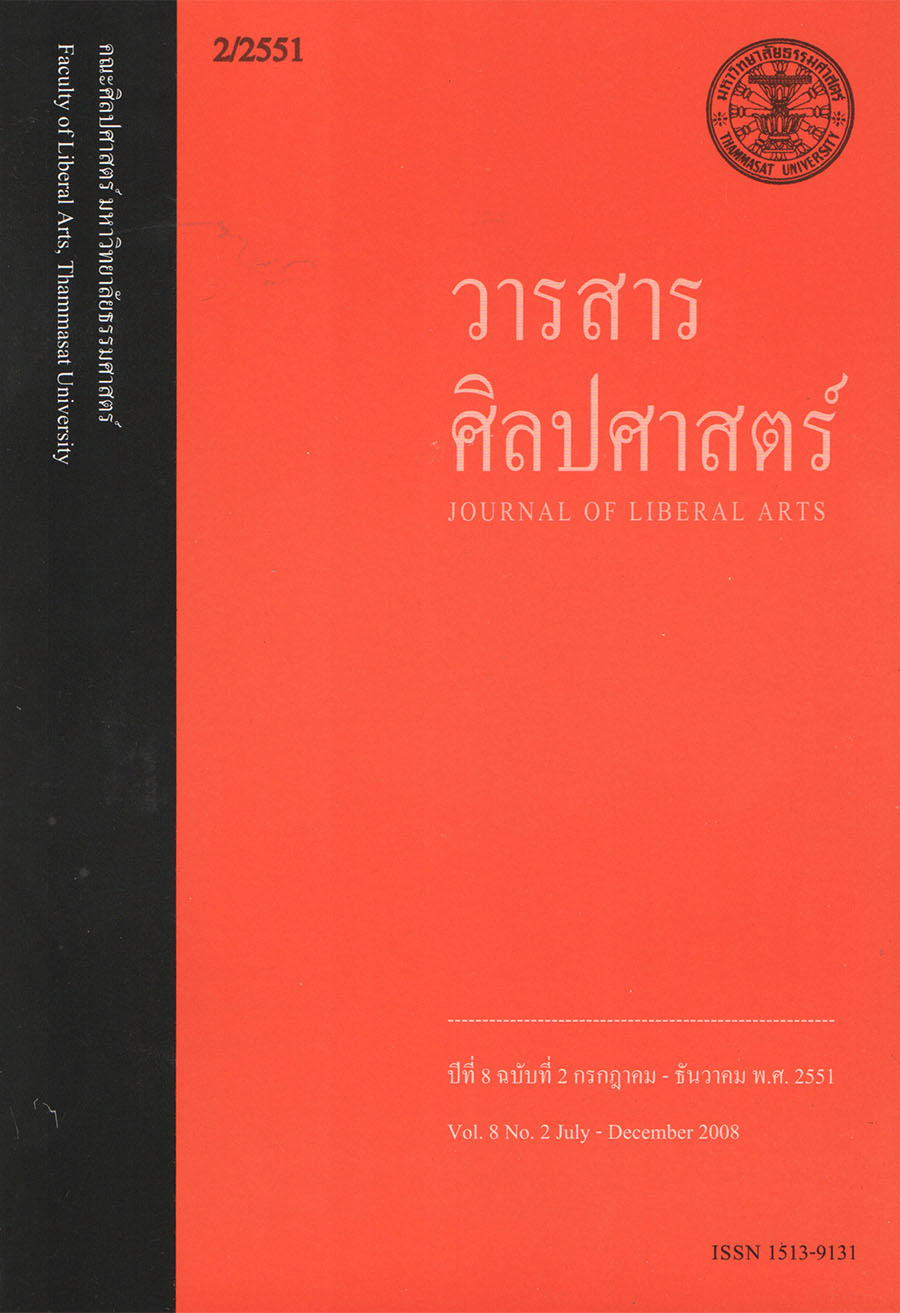ผู้หญิงกับหนังรักแบบไทย ๆ และความสัมพันธ์ข้ามชาติ
Main Article Content
บทคัดย่อ
หนังรักหาใช่เพียงแค่สื่อบันเทิงที่เน้นความสุขสนุกสนานให้กับผู้ชมเท่านั้น หนังรักยังทำหน้าที่แฝงอุดมการณ์แห่งรักตลอดจนอุดมการณ์บางอย่างได้อย่างแนบเนียน เพื่อพิสูจน์แนวคิดดังกล่าวงานวิจัยนี้จึงจะวิเคราะห์หนังรักข้ามชาติของไทยจำนวน 12 เรื่องในทศวรรษที่ 2520-2540 ตามแนวทางวัฒนธรรมศึกษา ผลการวิจัยแสดงให้เห็นว่า หนังรักเป็นเครื่องมือสำคัญในการสั่งสอนผู้ชมโดยเฉพาะสตรีให้เรียนรู้ถึงอุดมการณ์แห่งรักตลอดจนความรักชาติแบบคู่ขนาน นอกจากนั้น ภายใต้ระยะเวลากว่า 3 ทศวรรษอุดมการณ์ในหนังก็มีการเปลี่ยนแปลงไปไม่น้อยจากหนังรักแบบ “ชาติเหนือรัก” เช่น ภาพยนตร์เรื่อง “อารีดัง” (A-ree-dang) ที่มุ่งเน้นความรักตามทัศนะแบบชายเป็นใหญ่ซึ่งสนใจการต่อสู้เพื่อชาติของชายชาติทหารมากกว่ารัก สู่ “รักเหนือชาติ” หรือการเน้นการประนีประนอมและรักของสตรีต่อชายหนุ่มต่างเชื้อชาติและพื้นที่ต่างประเทศที่พัฒนา เช่น “คู่กรรม” (Kookam, Sunset at Choaprayaa) และ “พริกขี้หนูกับหมูแฮม” (A Very Romantic Story in the Very Big City: Plik Kee Nuu Kab Muuham) และการเริ่มวิพากษ์ความรักกับชาติใน “ไตร่ตรองรักกับชาติ” ตามทัศนะสตรีนิยมและชาตินิยมเชิงวิพากษ์ ที่แสดงให้เห็นว่าสตรีอาจเป็นได้ทั้งวีรสตรีที่ต่อสู้กับต่างชาติและกระแสชาตินิยม เช่น “ทวิภพ” (The Siam Renaissance) และ “สุดเสน่ห์หา” (Blissfully Yours) หรือเป็น “สินค้าข้ามชาติ” ใน “เรื่องรักน้อยนิดมหาศาล” (Last life in the Universe) และ “ผีเสื้อร้อนรัก” (Butterfly Man)
The role of romantic films is not limited to pure entertainment. They also tactfully subtly contain and channel various ideological agendas, including romance. This research, therefore, aims to verify the above notion through the study of twelve Thai romantic films launched during 1977-1997 based on the cultural studies model.
Study has shown that a romantic film plays an important role in teaching its audience, women in particular, about the ideology of romance along with the idea of nationalism. Ideologies contained in Thai romantic films have also significantly changed over the last three decades-that is the idea of ‘the country before romance’ has shifted to ‘romance before the country’. For example, the film ‘A-Ree-Dang’ portrays male-dominated romance in which the main male character chooses his country instead of his love for a woman. ‘Kookam’ and ‘Plik Kee Nuu Kab Muuham’ on the other hand are focused on compromise and love of Thai woman towards foreign men and developed countries. As well, ‘The Siam Renaissance’ and ‘Blissfully Yours’ represent criticism of both romance and the country based on feminism and critical nationalism, saying females can be heroines who stand against foreign power and reject nationalism while ‘Last Life in the Universe’ and ‘Butterfly Man’ portray Thai women as ‘cross-national goods.’


